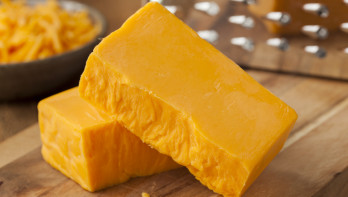Interview Kaas-Pack
'Cheese a healthy product that will remain popular'
Grating, cutting, and packaging cheese is a daily routine at family business Kaas-Pack Holland in Hoogeveen. Significant volumes are processed. Last year about 22,000 tons of cheese, but the goal is to further expand in the coming years, also in service offerings. The expected decline in dairy farming does not change their minds. Brothers Albert (52) and Erik (48) Koekoek are clear: "The decrease in milk production in the Netherlands is a signal that is being given, but that does not automatically mean that business developments will be halted. Of all dairy products, we think cheese will be the least vulnerable to the expected decline."
For a conversation, we meet in Hoogeveen, where Kaas-Pack has its production location just a stone's throw away from the DMK factory. The company is celebrating its golden jubilee this year, which is a good reason for a conversation. Processors like Kaas-Pack often operate less in the spotlight than producers but nevertheless play an important role in the dairy chain.
Henk Koekoek, the father of the brothers (on the right in the photo, with Albert on the far left and Erik in the middle), started five decades ago with a market stall and expanded it to three market routes in a number of years. In the 1990s, the focus was completely shifted to grating and packaging cheese. "For our father, this was quite a leap into the unknown because market sales were still a strong pillar under the company at that time. But he felt it was necessary to make a clear choice. He saw many opportunities to grow the processing branch but did not want the market sales, where he had worked for about twenty years, to suffer. The markets were sold within the family and still exist today."
ExpertCheese Enters
The cheese company was initially established in an existing building in Hoogeveen, which received a major renovation for the new purpose and was furnished anew. In 2004, a new building was constructed at Buitenvaart, near the Dairy Park outside the city. There, the wings were further spread. In 2011, the 'cheese cleaner' Kruiveem in Tolbert was acquired, ensuring control over various raw material streams. The company was relocated to Hoogeveen in 2016, where it continued under the name ExpertCheese. It was established in a specially purchased building there.
'Pa' Koekoek - as the brothers respectfully call him - had already been out of the business for some time. He formally stepped out in 2006, but still likes to follow the developments and his car stops several times a week at one of the two companies. Every Friday, over a cup of coffee in their parents' private home, the world is discussed. Meanwhile, the third generation is cautiously entering the scene. Preferably after gaining experience outside and preferably in the dairy sector.
Albert and Erik keep their tasks well separated. This works fine because they are quite different. "We complement each other," says Erik. Albert nods. It works well, and often they can read each other's thoughts from a distance. Albert focuses on sales, HR, finance, and quality. Erik deals with procurement, production, and logistics.
Flying Start in Retail
Traditionally, Kaas-Pack mainly does business with industrial customers, but in 2020, the focus was also placed on retail. This was a strategic choice because today the growth of the company is mainly in that market segment. Moreover, customers often ask for large volumes, which makes it interesting. The decision unexpectedly turned out very well. "The coronavirus crisis emerged, and as a result, the demand from retail increased significantly. At that time, industrial cheese sales were declining sharply due to lockdowns in many countries," Albert recalls the early stages of this new direction. Meanwhile, the crisis is behind us.
How do they like the retail sales for the company now? "The fun part about retail is the many product innovations, where we can add value with our knowledge. But supermarkets are critical customers, and margins can be low," says Albert. "Mistakes are costly," Erik adds. "In the beginning, we had to step up to meet the quality requirements of retail, but now we have the process well under control and do business with retailers in different countries."
Daring to Say No
The business model of Kaas-Pack, seen from a distance, is characterized by Drenthe solidity with a touch of stubbornness. For example, the company does not feel inclined towards contract manufacturing for third parties. Instead, they strive for good long-term relationships. Internally, they call this 'partnerships.' "We do business with a wide variety of cheese producers in the Netherlands and Germany, from whom we buy the raw material. Both private and cooperative, without going into names."
When asked what makes the company an attractive processor for these companies, there is a brief pause. Then Albert says, "I think it has to do with our down-to-earth nature, which characterizes more people from this region. A deal is a deal for us. It sounds simple, but in practice, it does not always have the desired effect. It also helps that we, as brothers, have been running the company for many years. This is in contrast to other companies where there are sometimes many changes in management. We also dare to say no when necessary." Erik adds that they both get excited about custom solutions, such as packaging. "This is how we try to distinguish ourselves from the crowd. And if we believe in something together with a partner, we go for it. We have been working with such a partner for a while on the market launch of cheese with a high protein content. Not necessarily the easiest process, but this could be something considering the success of milk powder shakes as sports nutrition."
The search for alternative, renewable packaging, meanwhile, poses quite a challenge. Everyone agrees it needs to be different from what is currently on the market, with the same properties, but finding a good alternative is not easy. Kaas-Pack is not alone in this search, but it is difficult. Erik believes that the company is very close to a solution.
Ambitious Growth Plans
Kaas-Pack closely monitors developments in the Dutch dairy farming industry, despite having no direct link to farmers. The scenarios of decline, possibly up to 20%, as recently outlined by Rabobank, do not deter the company from scaling up significantly. Plans have been made to double the production from 22,000 tons within a few years.
The current production location is full, and the brothers see enough demand in the market to want to grow. Moreover, additional scale also offers the opportunity to improve marginally, they believe. Therefore, two plots next to the current location were recently purchased. "The neighbor's land may often be too expensive, but this offers us a unique opportunity to grow significantly at the same location," says Erik.
Despite less milk, there is confidence that various market opportunities can be seized. "In addition to the idea that cheese will be less vulnerable, 40,000 tons is still not a world volume when compared to the total cheese production in Northwestern Europe. Cheese is a healthy product that will remain popular with many consumers in the future, despite the rise of vegan options." However, according to the brothers, it is important to differentiate in the market. Therefore, they will focus even more on projects with added value.
Anticipating
The decline in milk production will nevertheless have consequences. In the sense that cheese prices may fluctuate even more in the coming years than they already do. They did not expect the rapid rise in cheese prices in mid-May. According to the brothers, it is important to assess the risks well and anticipate them wisely in trading positions. "Sometimes you also have to dare to take risks," they conclude with a smile

